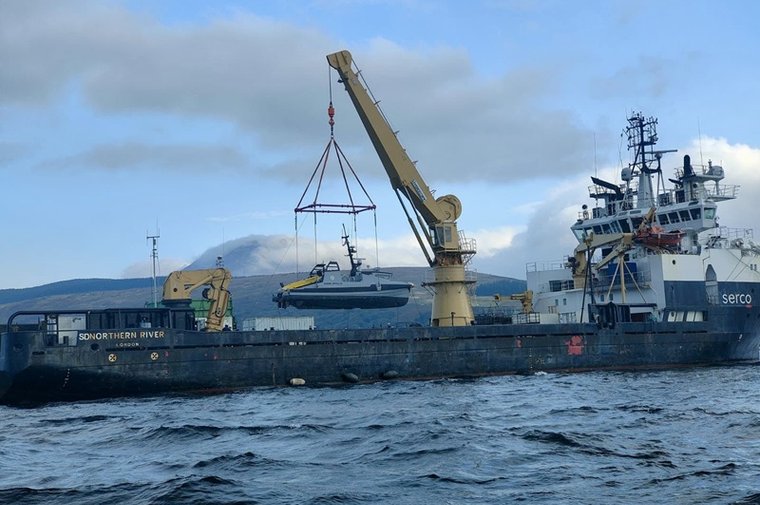UKs Royal Navy trials autonomous mine hunting capability
Details
More Products & Services
Products & Services
Shephard Plus Update
Shephard Media
Shephard Plus is updating in June 2018 with rich new capabilities, and is now one of the most cost-effective and valuable aerospace and defence market intell...
Defence Insight
Shephard Media
Some of the things people like you use Defence Insight for:
- Total addressable market sizing ($)
- Competitor analysis
- Cost analysis
- Market forecasting
- Growth identification
- Increasing closing ratio
- Increasing closing order value
- Estimating product potential
- Calculating sales forecasting
- Supply and demand analysis
- Total addressable market sizing ($)
- Competitor analysis
- Cost analysis
- Market forecasting
- Growth identification
- Increasing closing ratio
- Increasing closing order value
- Estimating product potential
- Calculating sales forecasting
- Supply and demand analysis
Military Unmanned Systems Handbook
Shephard Media
The Military Unmanned Systems Handbook (Digital Download) is an international guide to the military UV industry and provides detailed information on air, ground and sea (surface & sub-sea) vehicles as well as subsystems. What's included: Unencrypted 390+ page PDF of equipment and supplier information Market summary
Description
The UK's Royal Navy (RN) has tested an uncrewed small boat, the Apollo, as an autonomous minesweeping and countermeasures option, to avoid putting human sailors at risk.
The Apollo maritime mine counter measure (MMCM) vessel was designed to be deployed from a larger ship, and operated as an autonomous mine hunting tool for the navies of the UK and France through an agreement managed by OCCAR (the Organisation for Joint Armament Co-operation) which represents both nations).
The Apollo was deployed in the Firth of Clyde in Scotland, which has both significant water depth and coastal currents to challenge any vessel. It was launched from Defence Marine Services' ship SD Northern River.
Related Articles
Royal Navy sails autonomous RIB in UK waters for the first time
The Apollo, manufactured by L3 Harris under a contract with Thales (France), was delivered to the UK as a concept demonstrator in 2021. Following its Scottish trial, the vessel has been returned to Thales for retrofit and upgrades ahead of being transferred back to the Royal Navy in 12 months' time.
Commander Daniel Herridge, commanding officer of the RN's Mine & Threat Exploration Group, said the trial was “another step in the paradigm shift of delivering mine counter measures capability in a completely new way”.
Andy Lapsley, mine hunting capability (MHC) team leader at Defence Equipment & Support added: “This trial successfully demonstrated the potential for the maritime mine counter measures capability to be deployed flexibly and at pace for the Royal Navy, demonstrating our commitment to advancing mine counter measures technology and commercial platform integration.”
The trial follows hard on the heels of the RN's first trial in UK waters of a remotely controlled and autonomous rigid hull boat, the Autonomous Pacific 24. The results of that trial found that the uncrewed vessel could go faster in rougher sea states than a crewed vessel, opening up opportunities for the use of autonomous vessels in scenarios of significant threat.
The Apollo maritime mine counter measure (MMCM) vessel was designed to be deployed from a larger ship, and operated as an autonomous mine hunting tool for the navies of the UK and France through an agreement managed by OCCAR (the Organisation for Joint Armament Co-operation) which represents both nations).
The Apollo was deployed in the Firth of Clyde in Scotland, which has both significant water depth and coastal currents to challenge any vessel. It was launched from Defence Marine Services' ship SD Northern River.
Related Articles
Royal Navy sails autonomous RIB in UK waters for the first time
The Apollo, manufactured by L3 Harris under a contract with Thales (France), was delivered to the UK as a concept demonstrator in 2021. Following its Scottish trial, the vessel has been returned to Thales for retrofit and upgrades ahead of being transferred back to the Royal Navy in 12 months' time.
Commander Daniel Herridge, commanding officer of the RN's Mine & Threat Exploration Group, said the trial was “another step in the paradigm shift of delivering mine counter measures capability in a completely new way”.
Andy Lapsley, mine hunting capability (MHC) team leader at Defence Equipment & Support added: “This trial successfully demonstrated the potential for the maritime mine counter measures capability to be deployed flexibly and at pace for the Royal Navy, demonstrating our commitment to advancing mine counter measures technology and commercial platform integration.”
The trial follows hard on the heels of the RN's first trial in UK waters of a remotely controlled and autonomous rigid hull boat, the Autonomous Pacific 24. The results of that trial found that the uncrewed vessel could go faster in rougher sea states than a crewed vessel, opening up opportunities for the use of autonomous vessels in scenarios of significant threat.

Share
Recent Chats
Share via email
Future: handle WhatsApp here
Future: handle LinkedIn here
Future: handle Twitter here
SUBMENU HERE
Share via Chat
Copy Link



